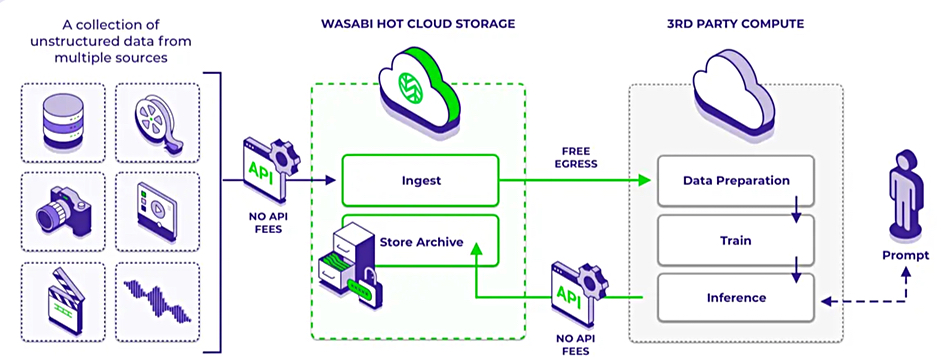Cloud storage supplier Wasabi has raised $32.5 million and set up AI data storage facilities with export to external GPU compute.
Wasabi Technologies started out providing S3-compatible public cloud object storage as an Infrastructure-as-a-Service supplier (IaaS). Now it has file (NAS), video surveillance and video media storage offers. Basically, it resells disk drive space for much less than AWS, Azure or GCP to people who don’t want the bother of running their own HDD-based object or file storage operation in-house. For example, it undercuts AWS by up to 80 percent and has no egress or API request fees. It partnered with Kioxia to add NVMe SSDs into its storage mix earlier this year, and now has a Wasabi Direct Connect offering for low latency and high bandwidth data transfers.
Wasabi raised $250 million to grow its business by adding regions in 2022 – it added Italy in 2024, passed 100,000 customers, and added AI-powered metadata generation for video data (AiR) last year by acquiring Curio.
According to a recent filing, the company has raised $32.5 million in a private placement share sale to three investors, in which shares worth $70 million were on offer. This takes the total raised since being started up in 2015 to around $580 million.
The AI data storage offering has ingest and archival storage aspects. Ingested data can be indexed, cataloged, and have custom metadata added to it, using the acquired Curio technology. The archive part means storing it in Wasabi’s existing object storage facility. It says its “low-latency object storage accelerates training, fine-tuning, and inference, with 100 Gbps direct connect for real-time AI updates.”

Wasabi says its AI storage connects with GPU providers (Nvidia Inception Program), AI/ML tools such as large language models, ML platforms, and cloud AI services. There is a single pricing tier: $6.99 per TB/month pay-as-you-go.

The AiR tier refers to Wasabi’s automated indexing, cataloging, and metadata tagging of video data. There is a wait list for this and it’s not open to new customers. RCS in the table refers to reserved capacity storage.
There is no specific AI data storage tier and no ability to run GPU compute inside Wasabi’s cloud, unlike AWS, Azure, and GCP. Wasabi does not support S3 over RDMA, unlike Cloudian and MinIO, but then none of the big three public clouds support it either.
We think that Wasabi’s AI data storage offering is in its very early days and hope to see more AI and AI data pipeline facilities being offered in the future. For example, specific AI storage classes, in addition to, and differentiated from, the current object, NAS, and video-surveillance classes. They would be differentiated by having extra AI-specific services, but what they might be is unclear. The under-subscribed funding suggests investors can’t yet see this either.
Bootnote
Michael Bayer, Wasabi’s CFO, told us: “We have held our financing release as it will be done in multiple closings due to various statutory requirements we have to follow because we may be oversubscribed. We anticipate the round will have a final close in the third or fourth week of October, and once we are closed, we will have a comprehensive release regarding the amount and participants.”








